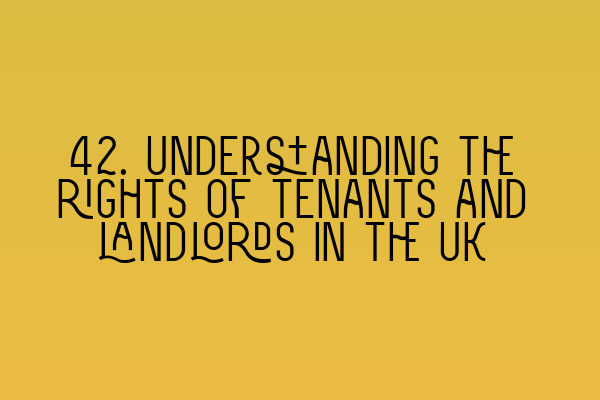42. Understanding the rights of tenants and landlords in the UK
Welcome to another informative blog post from SQE Property Law & Land Law! In today’s post, we will be delving into the intricacies of the rights of tenants and landlords in the UK. Whether you are a current tenant, a prospective landlord, or simply someone interested in the intricacies of property law, this post is for you. So, grab a cup of coffee and let’s dive right in!
1. Tenant Rights in the UK
As a tenant in the UK, it is crucial to understand your rights and responsibilities. One key aspect of tenant rights is the right to “quiet enjoyment” of the property. This means that as a tenant, you have the right to live peacefully in the property without interference from the landlord. It also includes the right to have essential services and repairs provided by the landlord.
Another essential tenant right is protection against unfair eviction. In the UK, landlords must follow specific legal procedures and provide valid reasons for evicting tenants. This ensures that tenants are not unjustly forced to leave their homes.
For a comprehensive understanding of tenant rights and responsibilities, you can refer to our detailed article on tenant rights in the UK.
2. Landlord Rights in the UK
While tenant rights are essential, it is equally important to understand the rights of landlords in the UK. Landlords have the right to receive rent from their tenants on time and in full. They also have the right to take legal action for unpaid rent or breach of tenancy agreements.
Landlords have the right to carry out necessary repairs on the property and recover reasonable costs from the tenants. They also have the right to inspect the property with proper notice to ensure it is well-maintained.
To gain a deeper understanding of landlord rights and obligations, check out our comprehensive article on landlord rights in the UK.
3. Legal Obligations of Tenants and Landlords
Both tenants and landlords in the UK have certain legal obligations that they must fulfill. Tenants are obligated to pay rent on time, keep the property clean and in good condition, and notify the landlord promptly if any repairs are required. They must also comply with the terms and conditions of the tenancy agreement.
On the other hand, landlords have legal obligations such as providing a safe and habitable environment for the tenants, ensuring the property meets all necessary health and safety standards, and protecting the tenant’s deposit in a government-approved scheme.
For a comprehensive list of legal obligations of tenants and landlords, head over to our informative article on legal obligations of tenants and landlords.
4. Dispute Resolution
Despite everyone’s best efforts, disputes between tenants and landlords can sometimes arise. In such cases, it is crucial to understand the options available for dispute resolution. Mediation and negotiation are often the first steps to resolving disputes amicably. If those methods fail, tenants and landlords can take legal action or seek assistance from relevant governing bodies.
To learn more about dispute resolution options and alternative avenues for solving conflicts, visit our detailed article on dispute resolution in property law.
We hope this blog post has shed some light on the rights of tenants and landlords in the UK. It is crucial to have a firm grasp of these rights and responsibilities to ensure a smooth and fair tenancy. For further assistance or to enhance your knowledge in property law, don’t hesitate to explore our range of comprehensive SQE preparation courses.
Remember, knowledge is power, and being well-versed in property law can greatly benefit both tenants and landlords. Stay tuned for more informative posts from SQE Property Law & Land Law!
Disclaimer: This blog post is intended for informational purposes only and should not be considered legal advice. For personalized legal advice, please consult with a qualified solicitor.
